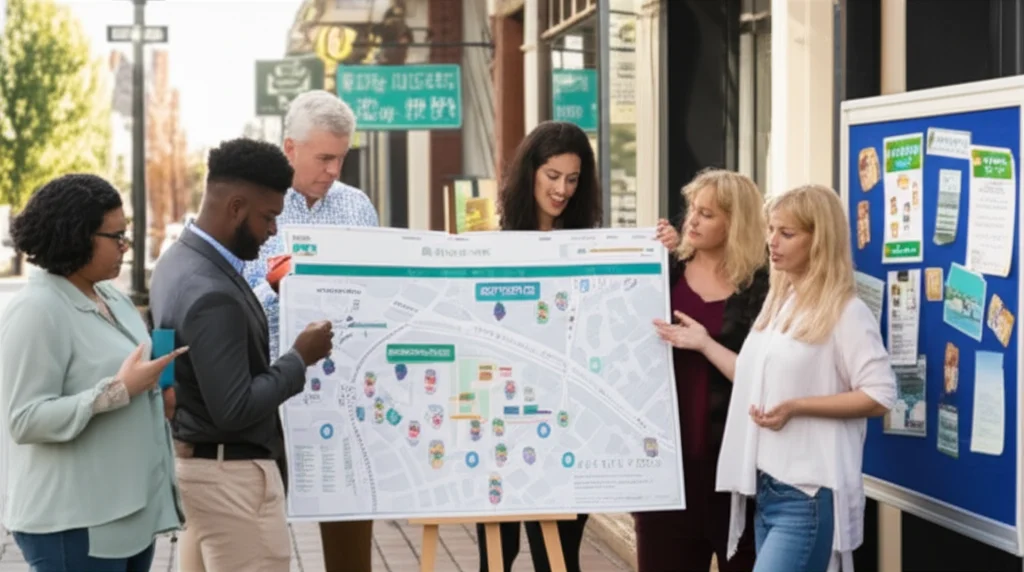Okay, let’s talk about getting a mobile food business off the ground in Wisconsin. It’s an exciting venture, no doubt, bringing your culinary creations directly to the people! But, and there’s always a but, the reality is that before you fire up that fryer or grill, you’ve got a fair amount of paperwork and permission slips to gather. One of the biggest headaches folks face, and something I’ve guided countless entrepreneurs through over the years, is navigating the layered world of licensing – specifically, those concurrent state and local requirements. It’s not just getting a license; it’s often getting multiple licenses and making sure they all play nicely together. Messing this up can cause delays, fines, or even keep you parked when you should be selling. Understanding this multi-level system upfront is absolutely critical to a smooth launch and long-term success.
Laying the company Foundation: State-Level Essentials Beyond the Food
Before you even think about food permits, you need to establish your business legitimately with the state. This is foundational – and honestly, it sets the stage for everything else. In Wisconsin, this primarily means dealing with the Wisconsin Department of Financial Institutions (DFI). They’re the folks who register your business entity. Most mobile food vendors I work with choose either an LLC or a corporation. There are pros and cons to each regarding liability, taxes, and structure, and frankly, that’s a whole other conversation (worth having, though!). But whether you’re pursuing `Wisconsin LLC formation` or `Forming a corporation Wisconsin`, the DFI is where you start. You’ll need to perform a `Wisconsin business name search` through the DFI’s portal to make sure the name you want isn’t already taken. Don’t skip this; picking a name and then finding out it’s unavailable after you’ve printed menus is a real bummer. Once you’ve settled on a name and entity type, you’ll file your formation documents with the DFI. If you form an LLC, it’s Articles of Organization; for a corporation, it’s Articles of Incorporation. This process formalizes your enterprise in the eyes of the state. A key part of this is designating a `Registered agent Wisconsin` – someone located in the state who can receive official legal and tax documents on your behalf. You can be your own registered agent, but I often advise clients to use a professional service, especially if you plan on moving your vending location frequently or just want to keep your home address private. It adds a layer of professionalism and ensures you don’t miss crucial notices. And don’t forget ongoing requirements! The state requires annual filings, like the `Wisconsin annual report filing`, with the DFI to keep your business entity in good standing. Falling behind on this can lead to administrative dissolution, which is a headache you absolutely want to avoid. Think of getting your business entity sorted with the DFI as step one in your `Wisconsin startup guide` for any business, mobile food included. It’s non-negotiable.
Securing the State Food License: Your Baseline for Safety
Okay, business entity registered? Check. Now, let’s talk about the actual food part. In Wisconsin, the primary state agency responsible for food safety regulations and licensing for mobile units is the Department of Agriculture, Trade and Consumer Protection (DATCP). They issue the state Mobile Retail Food Establishment license. This is your ticket to legally sell food from your truck, trailer, or cart anywhere in the state. Think of this as your baseline clearance. DATCP has a comprehensive set of rules based on the Wisconsin Food Code, which itself largely mirrors the FDA Food Code. These rules cover everything from food sourcing and storage to preparation, handling, sanitation, and employee health. Getting this license involves submitting an application, paying a fee, and, most importantly, passing an inspection. The inspection criteria are detailed and cover things like:
- Handwashing facilities (absolutely critical and often a point of failure).
- Proper holding temperatures for hot and cold foods.
- Sanitation of surfaces and equipment.
- Water source and wastewater disposal.
- Approved commissary or servicing area (this is huge for mobile units – you generally need a licensed base kitchen to prep, store, and clean).
This state license signifies that your operation meets a certain standard of food safety that’s applicable statewide. It’s a rigorous process, but it’s there to protect public health, which is paramount. Don’t view it as just red tape; view it as building trust with your customers by demonstrating you’re committed to safety. My advice? Get familiar with the Wisconsin Food Code early. It’s dense, but understanding the requirements before you design your truck layout or finalize your menu will save you headaches down the road. DATCP usually has resources and guides specifically for mobile vendors.
Navigating the Local Maze: Where the Concurrent Really Bites
Alright, you’ve got your state company entity locked down with DFI, and you’ve secured your state Mobile Retail Food Establishment license from DATCP. You’re ready to roll, right? Well, maybe. This is where the concurrent aspect of licensing hits hard, and it’s often the most confusing part for new vendors. While your state food license allows you to operate from a food safety perspective anywhere in Wisconsin, individual cities, villages, and counties have their own rules and requirements for mobile vendors operating within their specific jurisdiction. This is primarily driven by local health departments (often acting as agents for DATCP or having their own ordinances), zoning laws, and general vendor permits. Here’s the kicker: these local requirements vary wildly from one municipality to the next. What’s perfectly acceptable in Milwaukee might be a non-starter in Madison or Green Bay. You might need:
- Local Health Department Permits: Even with a state license, some local health departments need their own permit and may conduct their own inspections, often focused on ensuring compliance with local ordinances that might be stricter or have additional requirements beyond the state code.
- Vendor or Peddler Permits: Most cities require a general vendor permit just to operate any kind of sales within their limits. This isn’t food-specific but is necessary for any mobile firm.
- Zoning and Location Rules: This is HUGE. Where can you park? How close can you be to a brick-and-mortar restaurant? Can you operate in residential areas? Are there noise restrictions? Furthermore, designated vending zones? These are all set at the local level. Some cities are mobile-food-vendor friendly; others are… less so.
- Specific Event Permits: Operating at a festival or farmers market? That event likely requires its own specific permit, and they’ll definitely want to see your state (and potentially local) food licenses before letting you set up shop.
I’ve seen vendors get their state ducks in a row, only to show up in a city expecting to sell, only to be told they need three more permits from the city clerk, the local health department, and the parks department if they wanted to park near a park. It’s frustrating, and frankly, it feels inefficient, but that’s the system we have. My best advice here? Identify the specific cities or areas you plan to operate in and contact each of their clerk offices and local health departments directly. Don’t assume anything. Ask them specifically about requirements for mobile retail food establishments or food trucks. Get a checklist from each place. Yes, it’s time-consuming, but it’s the only way to be sure you’re legal wherever you plan to park.
The Concurrent Conundrum: Making Sure State and Local Align
So, you have a state business entity, a state food license, and you’re starting to understand the patchwork of local permits. How do they all fit together? This is the heart of navigating those concurrent requirements. The state food license from DATCP is foundational – you generally can’t get any local food-related permit without proving you hold a current state license. The local permits then layer on top, addressing municipality-specific concerns like zoning, parking, and potentially local health ordinances that supplement state rules. Think of it like building a house: the state sets the building code minimums (food safety foundation), but the city adds zoning laws (where you can build), parking restrictions (where you can park your car during construction), and maybe even requires a specific local inspection on top of the state one just to be sure. The key areas where state and local requirements interact significantly are often:
- Inspections: While DATCP inspects your unit for the state license, local health departments in the areas you operate might also inspect you, either regularly or on a complaint basis. They’re ensuring you’re complying with both state code and any local health ordinances.
- Commissary Requirements: State law requires mobile vendors to have a licensed commissary. Local jurisdictions often verify this and might have specific rules about what constitutes an acceptable commissary within their limits or how often you must visit it if it’s located elsewhere.
- Documentation: When applying for local permits, you will almost certainly need to supply proof of your state business registration (like your DFI entity ID or certificate) and your state Mobile Retail Food Establishment license. The local folks need to know you’re a legitimate business entity cleared by the state for food operations before they grant you local privileges.
There isn’t one magic statewide permit that covers everything beyond the DATCP license for food safety. The concurrent nature means you’re constantly coordinating between state (DFI, DATCP) and multiple local authorities (cities, counties, local health departments). This is why starting early, staying organized, and having a checklist for each jurisdiction you operate in is absolutely non-negotiable. Trying to wing it is a recipe for disaster. This complexity is a perfect example of why resources like the `Wisconsin Economic Development Corporation (WEDC)` often have guides or can point you to small organization development centers that can help entrepreneurs piece together this regulatory puzzle.
Practical Steps & Avoiding Common Licensing Pitfalls
Okay, so you’ve got the picture: state business entity, state food license, and a mosaic of local permits. It sounds like a lot, and honestly, sometimes it feels like it. But breaking it down and approaching it systematically makes it manageable. Based on what I’ve seen working with folks in this industry, here’s my go-to advice for navigating this:
- Start Early, Like, Really Early: Don’t wait until your truck is built to start the licensing process. The state license can take time, and gathering local permits for multiple cities takes even longer. Begin researching and applying months before your target launch date. Seriously, months.
- Get Your Business Entity Done FIRST: As discussed, registering with the DFI is foundational. Do your `Wisconsin organization name search`, decide on your structure (`Wisconsin LLC formation` or `Forming a corporation Wisconsin`), file, and get your `Registered agent Wisconsin` in place. You’ll need this proof of legitimacy for later steps. Stay on top of your `Wisconsin annual report filing` too!
- Talk to People: Don’t rely solely on websites. Call the DATCP licensing specialist for mobile units. Call the clerk’s office and the health department in every single city you plan to operate in. Introduce yourself, explain you’re a mobile food vendor, and ask for a list of all required permits, licenses, and inspections. Get names and direct phone numbers if possible.
- Create a Master Checklist: For each municipality, list the required permits, fees, necessary documentation (like your state license info), and contact person. Keep copies of all your applications and issued permits in a binder or digital folder – easily accessible. You will be asked to show proof.
- Understand Commissary Requirements: This is often a hurdle. confirm your commissary is properly licensed and meets state and local requirements for servicing a mobile unit. Inspectors will check on this.
- Budget for Fees (and Time): Licensing isn’t free. State fees, local fees, inspection fees – they add up. Factor this into your startup costs. More importantly, budget time for the process. Applications, inspections, potential re-inspections – it all takes time. Patience is key.
- Don’t Assume Reciprocity: Just because City A accepts your state license and issues a local permit doesn’t mean City B will make it as easy. Each jurisdiction has its own rules, and they generally won’t bend them just because another town does things differently.
Look, navigating this concurrent state and local licensing landscape for mobile food vendors in Wisconsin isn’t the most glamorous part of the job. It requires diligence, patience, and a willingness to work with multiple government entities. But getting it right is absolutely essential for running a legal, compliant, and successful business. By understanding the different layers – state venture registration (DFI), state food safety (DATCP), and the various local requirements – and approaching the process methodically, you can avoid costly mistakes and focus on what you really want to do: serve amazing food to happy customers. It’s a challenge, yes, but one that’s definitely surmountable with the right approach.




